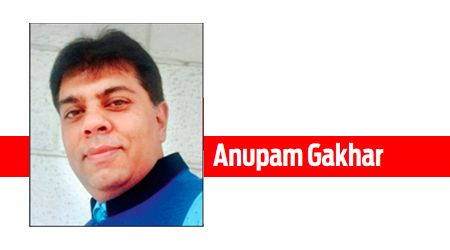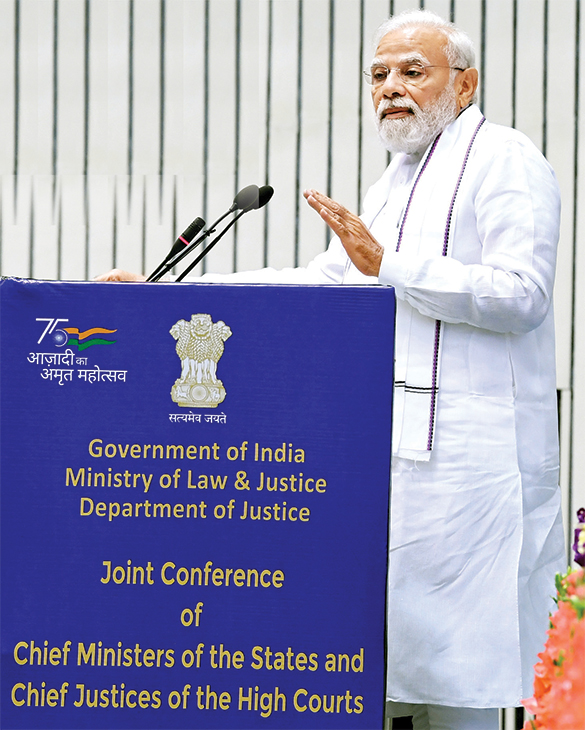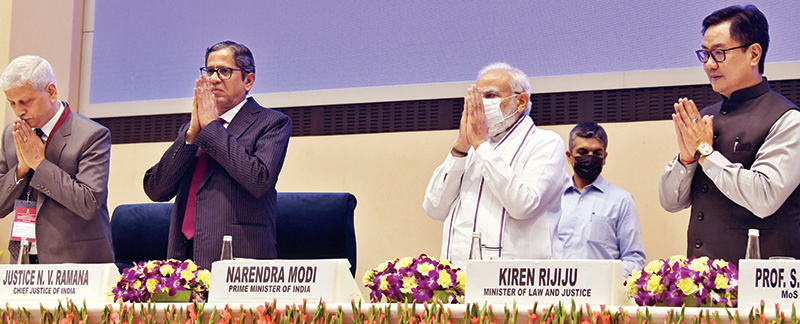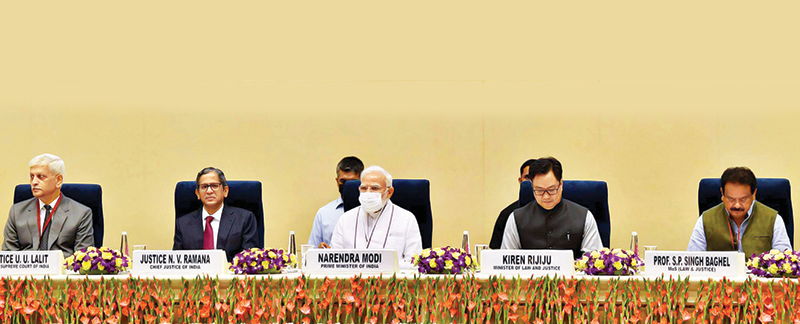 Speaking at a felicitation ceremony organised by the Association of Indian Americans in San Francisco, Chief Justice of India NV Ramana recently hit out at “forces whose only aim is to run down the only independent organ” in the country. “As we celebrate the 75th year of
Speaking at a felicitation ceremony organised by the Association of Indian Americans in San Francisco, Chief Justice of India NV Ramana recently hit out at “forces whose only aim is to run down the only independent organ” in the country. “As we celebrate the 75th year of
Independence this year and as our Republic turned 72, I must add here, with some sense of regret that we still haven’t learnt to appreciate wholly the roles and responsibilities assigned by the Constitution to each of the institutions,” he said. “The party in power believes that every governmental action is entitled to judicial endorsement. The parties in Opposition expect the judiciary to advance their political positions and causes.”

The CJI felt concerned and said, “This flawed thinking of all hues flourishes in the absence of proper understanding among people about the Constitution and the functioning of democratic institutions.”
“It is the vigorously promoted ignorance among the general public which is coming to the aid of such forces whose only aim is to run down the only independent organ i.e. the judiciary,” he said and asserted, “Let me make it clear. We are answerable to the Constitution and Constitution alone.”

Justice Ramana had a suggestion too. “To enforce checks and balances envisioned in the Constitution, we need to promote a Constitutional culture in India. We need to spread awareness about the roles and responsibilities of individuals and institutions. Democracy is all about participation,” he said. Judiciary is one organ of Indian democracy which has maintained independence at the highest level.
Our Supreme Court has ensured that the faith of the public is never eroded. Time and again, it has upheld that faith by giving judgments that have not matched the narrative painted by political parties. However such narratives do raise apprehensions in the minds of foreign investors.

Allaying their anxiety, Justice Ramana said in his inaugural address at the fourth edition of international conference on ‘Arbitration in the era of globalisation’ held in March 2022 in Dubai, “A prerequisite for achieving globalisation in its true sense is ensuring universal respect for the rule of law.” He added: “Wherever I travel, I am often asked as to how investorfriendly the Indian judicial system is. My answer is always the same: you can trust the Indian judiciary for its absolute independence and its inherent constitutional strength to treat all parties equally and equitably.”
The preamble of the Indian Constitution promises justice social, economic and political. For fair, just, and unbiased decisions, the judiciary must be free from any kind of dominance, threat or undue influence so as to work upon their will and conscience and not under threat or influence. Independence of Judiciary is one of the basic structures of the Constitution of India and has also been recognised as a human right by international conventions. Only when the country has an authoritative, independent and impartial Judiciary, can it dispense justice in controversies where public opinion can be vastly different from the facts. The judges of the country are not obliged to give a decision according to the ruling party or government. Any kind of dominance is prohibited.
The first Chief Justice of India, Justice Sir Harilal Jekisundas Kania had said, “In endowing the Supreme Court of India with very wide powers, the Constituent Assembly, the Assembly representing the voice of the people through their elected representatives, has shown complete confidence in the court as the final body for dispensing justice.” He went on to add, “We hope to deserve that confidence. We trust that the people of India will also maintain the independence, honour and dignity of the Supreme Court.”
Ever since India became a republic, the Supreme Court has maintained its position of reverence amongst the Indian public as savior of the constitution. The 1973 Kesavananda Bharati vs State of Kerala case is one such example where the court stood up to its task. The judgment set substantive limits on Parliament’s power to amend certain parts of the Constitution and gave birth to the ‘basic structure’ doctrine. Under this, the “basic features” of the Constitution are the fundamental rights granted to individuals, among other provisions.
In a landmark judgment issued by the Special Bench of the Supreme Court comprising 13 judges, the court ruled that Article 368 (which confers the right to amend the Constitution upon Parliament) “does not enable Parliament to alter the basic structure or framework of the Constitution.” Some people go on to say that the court through this judgment ‘saved Indian democracy’.
There are many other cases like the Maneka Gandhi vs Union of India in 1977, where the court asserted its authority and responsibility as protector of the Constitution. A sevenjudge bench re-emphasised the right to personal liberty as enshrined in Article 21 (Right to Life and Personal Liberty) of the Constitution, which was compromised upon during the Emergency when all Fundamental Rights were suspended for 21 months between 1975 and 1977.
It is neither judiciary made to opposition measure nor Government’s pleasure. In the highly celebrated decision in SP Gupta vs Union of India, 1982, the Constitution Bench of the Supreme Court held that Judges should be of stern stuff and tough fibre, unbending before power, economic or political, and they must uphold the core principle of the rule of law which says `Be you ever so high, the law is above you’. This is the principle of independence of the judiciary which is vital for the establishment of real participatory democracy, maintenance of the rule of law as a dynamic concept and delivery of social justice to the vulnerable sections of the community.
It is this principle of independence of the judiciary which we must keep in mind while interpreting the relevant provisions of the Constitution.
Another judge in the same Judgment said, “…While the administration of justice draws its legal sanction from the Constitution, its credibility rests in the faith of the people. Indispensable to that faith is the independence of the judiciary…

the framers of the Constitution took great pains to ensure that an even better and effective judicial structure was incorporated in the Constitution, one which would meet the highest expectations of judicial independence…..”
Another Constitution Bench in the Second Judges Appointment Case in 1993 declared that independence of judiciary is the sine qua non of democracy. So long as the Judiciary remains truly distinct from both the Legislature and the Executive, the general power of the people can never be endangered from any quarters.

FIVE-FOLD GUARANTEE
There are five provisions that ensure that the judiciary is free and independent in India
- Judges have the security of the tenure of their service. They are not appointed on the pleasure of the President. They can only be removed from their office for a reasonable cause such as misbehaviour and incapacity.
- The salaries of Supreme Court judges are fixed by the President of India and charged on the Consolidated Fund of India. Their salaries can only be reduced or altered in case of a financial emergency for the country.
- The Supreme Court judges are not allowed to practice in any court of India after their retirement. However, they can be appointed in review panels, tribunals or committees.
- Parliament by law cannot limit or reduce or curtail the powers of the apex court. The Supreme Court may be vested with more powers in adverse circumstances.
- The Parliament can’t abridge the power of issuing a writ in any case. The jurisdiction of the Supreme Court is the whole of India. It is considered as the final or last resort of justice.
- Article 129 of the Indian Constitution affirms that the Supreme Court shall be a court of record and has the authority (power) to punish for its contempt, either civil or criminal in nature














 G20 podium
G20 podium

